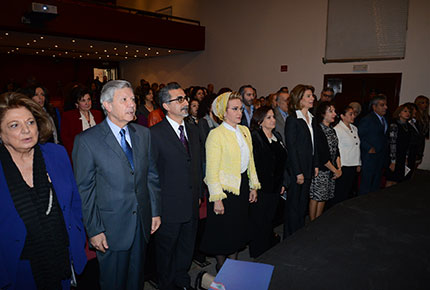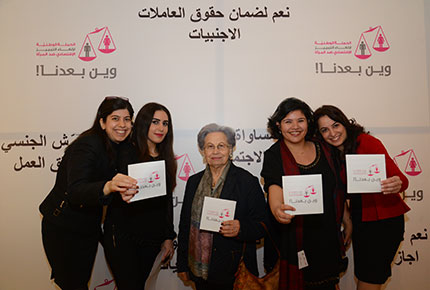Joining hands to eradicate discriminatory laws against women
LAU marks International Women’s Day by hosting campaign denouncing legal discrimination against women in Lebanon in cooperation with the National Commission for Lebanese Women.

From left: Chair of the Committee for Women and Children MP Gilberte Zwein; Head of the Administration and Justice Committee MP Robert Ghanem; Dr. Nashaat Mansour; NCLW Vice Chair Randa Berri; NCLW Chair, First Lady Wafaa Sleiman; NCLW Second Vice Chair Lama Salam; LAU’s Elise Salem, vice president for Student Development and Enrollment Management.
Dounia Khoury is the founder and president of the Deir Al-Ahmar Women’s Association, an NGO based in the Bekaa Valley. Under her leadership, the association won the Dubai International Award for Best Practices to Improve the Living Environment, beating out 549 other participants from 90 countries. Her work in improving the lives and economic conditions of families in Deir Al-Ahmar has been immeasurable. Yet, when time came for municipal elections, townspeople were reluctant to vote for her, opting instead for male candidates, overlooking merit in favor of gender.
Khoury was just one of the many participants in attendance at “Look Where We Are, Still,” a national campaign that aims to eradicate all discriminatory laws against women in the economic and social domains in Lebanon. The event marking International Women’s Day was held at LAU and organized by the Institute for Women’s Studies in the Arab World (IWSAW), in collaboration with the National Commission for Lebanese Women.
“As civil society groups, we can’t stop our advocacy,” said Khoury. “The representation of women in public offices in Lebanon is negligible. Countries around the world now measure progress by looking at the level of women’s participation in society, and our levels are shameful.” Moreover, according to the activist people erroneously think that women ask for their rights alone. “Equal rights for women means equal rights for their children and for their husbands. Women are asking to contribute to economic growth and the development of their countries,” she explained.
Fady Karam, attorney and secretary general of the National Commission for Lebanese Women, gave an extensive presentation on the legal status of women in Lebanon. “We are dealing with laws that continue to discriminate against women. These laws cover the spheres of social security, labor, bankruptcy and private education,” said Karam. “We’ve already amended seven laws and we still have 10 more to amend and I am proud to join my efforts to LAU and all NGOs in Lebanon that have full confidence in our Commission and hope that the parliamentarians who were present today will help in improving the situation of women and erasing any discrimination against them.”
Echoing Karam’s hopes, Dean of the School of Arts & Sciences Nashaat Mansour — who spoke on behalf of LAU President Joseph G. Jabbra — reiterated LAU’s firm commitment to women’s issues through its studies, academic publications and events aimed at women’s empowerment. For Dr. Samira Aghacy, head of IWSAW, nothing can be done without all parties firmly joining hands. “It’s very important for IWSAW to keep supporting changes in laws relating to women,” she said. “But if we had to do it on our own, I don’t think we would succeed.”
More
Latest Stories
- Alumna Lynn Nasr (BArch ’25) Shortlisted Among the World’s Top Architecture Graduates
- High Schoolers Step Into the Design World and Earn Scholarships to LAU
- The LAU Alumnus Driving Cloud Innovation in the Middle East
- Newly Discovered Compounds Display Potential for Future Cancer Treatment
- A Century of Lebanese Theater
- Interior Design Students Awarded for Social Impact
- Alumna Christelle Barakat Selected for a Prestigious Graduate Fellowship
- Alumnus Zak Kassas Returns to LAU to Share Pioneering Research on Navigation Resilience


